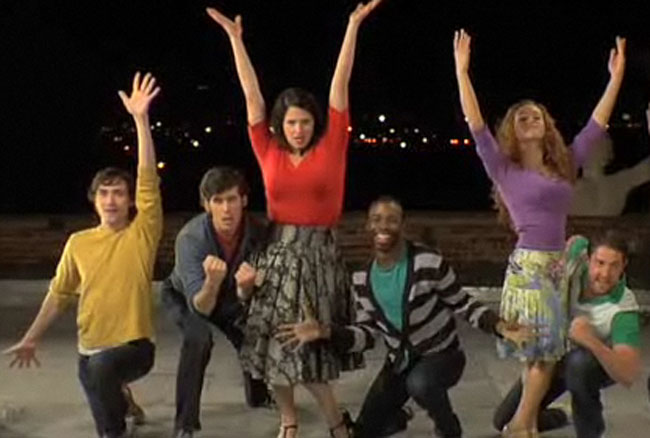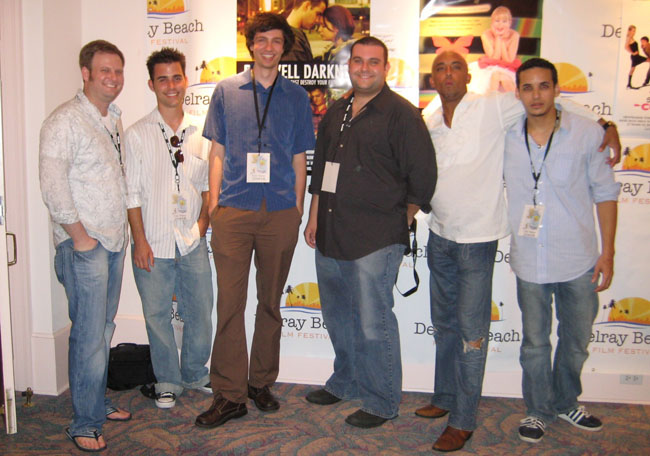CHICAGO – In anticipation of the scariest week of the year, HollywoodChicago.com launches its 2024 Movie Gifts series, which will suggest DVDs and collections for holiday giving.
Interview: Carl Sondrol, Music Scorer of Webby Award-Winning Shorts
CHICAGO – Carl Sondrol is on a huge winning streak. The musician, composer and soundtrack scorer for CollegeHumor.com is a vital part of the Webby Award winning shorts “Web Site Story” and “Pixar Intro Parody.” His work has also expanded into television, short films and feature films.
The Webby Awards will be given out Monday, June 14th, in New York City. Sondrol did the music and sound design for the winning shorts, even taking on the melodies and context of Leonard Bernstein’s “West Side Story.”
Carl Sondrol grew up in Iowa, playing keyboards, trumpet and accordion in a range of musical genres, including jazz, chamber music and rock. He played in a band called “Nuclear Biologist Rocket Surgeons,” a science-themed group accompanied by live Power Point presentations. Since 2008, he has scored over 60 short films for CollegeHumor.com, and his feature film work includes “Farewell Darkness,” and the shorts “The Old Man and the Seymour” and “Carpe Millennium.”
 Photo credit: CollegeHumor.com |
In anticipation of the upcoming Webby Awards Ceremony, HollywoodChicago.com spoke to Carl Sondrol on his contributions and career.
HollywoodChicago.com: How did you get involved with CollegeHumor.com and what do you remember about scoring Webby Award Winners ‘Pixar Intro Parody’ and ‘Web Site Story’?
Carl Sondrol: I got involved with them, strangely enough, through the first filmmaker I ever worked with, a friend of mine named David Fishel. The first film I ever scored was for him and he ended up being an editor for College Humor, when they were expanding about two years ago. They gave me a shot at scoring one of their videos, a ‘Jumanji’ type action/adventure score. They seemed to like it, and I’ve been working with them ever since.
As far as the two Webby Award projects, ‘Pixar Intro Parody’ was really fun from top to bottom. It’s a 3D animation piece by Mike Ritchie at Gloo Studios, and he did an amazing job. It was inspiring right off the bat. I did both sound design and music on that one, making sure they worked together.
HC: What do you appreciate about Leonard Bernstein [composer of ‘West Side Story’] after taking on the score for ‘Web Site Story’?
CS: I love that music. Honestly, I didn’t know it too well before going in but I sat down when I was starting the project and really listened to it, I was blown away. It has really cool textures and the music is really adventurous, especially for something so popular. Although, it was a quick turnaround as usual, and I couldn’t find sheet music, so I decided it would be a good exercise to figure everything out by ear. I did my best to do it justice.
HC: How do approach source material that is looking for you to produce a score? What is your process for allowing that material to inspire you?
CS: Basically, there are a couple of big rules I’ve learned over the years. The first thing I want to do is make sure the music completes each scene. When I watch a certain film scene, for example, I will ask myself the question ‘is this scene saying everything it needs to say?’ If so, maybe it doesn’t need music at all. Beyond that, do we want to enhance emotion on screen or do we want to mislead the audience, like a swell in a horror movie, or something like that. There is a lot of options.
The second rule is communicating a lot with the director and producer. They usually have strong ideas of what they want from the music and how it should add in the film.
HC: What do you like to get from the author of a work that you’re scoring. Does it help to delve into their personality?
CS: Yeah, I mean knowing how they think helps me figure out what they are trying to convey through their film. The stronger you can make your working relationship with the filmmakers the better the final product will be.
HC: What past musical training best prepared you to be a composer and scorer? Is there anything you would recommend to aspiring composers to study before they get into the game?
CS: I kind of had a random past to get here. [laughs] Basically it was just being interested and open-minded about music. I started playing piano and trumpet at a very early age and in high school I did both jazz and rock bands. When I got to college it was really eye-opening because there was a lot bigger music scene than my hometown. I didn’t know I was going to be a film composer at that point, [laughs] I was just trying to absorb everything.
As far as advice for aspiring composers. Music is part of the equation, with film music it helps to have a wide and varied background. But at the same time you have to be really driven and be willing to work really hard, and do a lot of hours that most people find ridiculous. [laughs] And when you’re working on crazy deadlines, the next day you have to not be a zombie when you’re talking to the director. You have to try to balance all that.
 Photo credit: Carl Sondrol Music |
HC: You grew up in a generation that uses computers for virtually everything. How did you computer training in music make composing easier and swifter?
CS: It helps tremendously. For example, when I’m working on something and it’s on a tight deadline, I can record everything electronically before bringing in any musicians at all. Maybe if I’m just coming up with some initial ideas, I can record maybe 5 ideas for each scene or section, and then work out what is working. If I think something would work in a faster tempo, I can change it very easily. Or change a part from piano to harpsicord. It’s very flexible is basically the big difference.
HC: Your success has been relatively swift. Besides College Humor and the opportunity to have it listened to, what do you think is in your particular style that has had people making inquiries about your music?
CS: I do my best to put my personality into my music, which all composers aspire to do. I also try to be open-minded about different things, so if the director has an initial general direction I’m very willing to start with that and see what kind of personality I can add to that. I love using great musicians and know a lot of great musicians in Chicago, which brings some real life to the music. The more experts I can bring on board, the better the score.
HC: Who were your inspirations as a musician? Because you’ve studied virtually every style, which one speaks to you the most when doing a musical score?
CS: Style depends on the project. I’ve done somber string quartets, whimsical stuff for comedies and action music. As far as people who influence me, there are a couple scores. I love Michael Giacchino’s ‘Up,’ it had a great tone and was very tasteful. I like Carter Burwell’s music a lot, especially ‘In Bruges,’ very quiet and beautiful tone, a nice counterpoint to a film about bumbling hit men. It gives the film a very clear mood.
HC: What musical scoring challenge would you like to take on in the future?
CS: I’m pretty open right now. I’ve done 60 shorts for College Humor since 2008, I have a pretty good track record with them, so I will continue on that path for awhile. At the same time, I’m doing more sound design work now, too, so I’m keeping possibilities open. It depends on what opportunities come along.
HC: Finally, what is coming up for you?
CS: I just finished producing a song for the CBS network for their ‘Upfronts Presentation’ – that’s where advertisers look at the new fall season and purchase airtime ‘upfront.’ The song and accompanying animation introduced the President of CBS, Leslie Moonves.
I’m making some infomerical musak for College Humor coming up, also an orchestral score for parody of the original ‘Alice in Wonderland’ animation, next a crazy ska song and a song about hoodies. In tandem with all that I’m working on sound design for a really cool interactive video project called ‘Man vs. Candy Machine.’ And then another film short with David Fishel, about 10 minutes, which involves a human size chinchilla puppet. [laughs] Lots of variety.
 | By PATRICK McDONALD |


